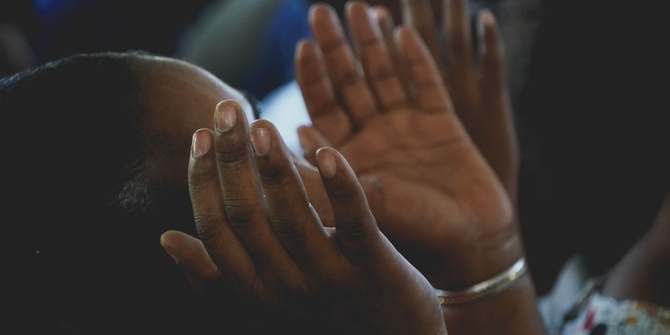In our latest blog post, Florence O’Taylor, a PhD student at the University of Durham, writes about the topic of addiction and treatment among women. In a system where treatment programmes are based on the needs and experiences of men, the broader issues of trauma and force experienced by many women are rarely addressed. As news outlets cover the ongoing debate about the safety and treatment of women in society, O’Taylor draws on Christian theology to understand trauma and affliction among women living with addiction and how a fresh approach can create not only better treatment programmes but also a more just society.

Substance dependence treatment has developed as a single-focussed intervention based on the needs of addicted men. Addiction is disproportionately considered a ‘male’ issue, with less provision for women. Provision that does exists is less effective for the female population, ignoring the key correlation between trauma and addiction for women. In order to correct this, we must pay attention to the particularities of women’s experiences of addiction, recognising addiction as socially produced, and rupture the dominion of force that propagates it.
Christian mystic, philosopher and political activist Simone Weil aides us in doing just this. In her essay on Homer’s Illiad, Weil reads the epic as narrating the history of force and its rupture through attention and reflection, providing a potent framework for analysis and resistance.
Force, she argues, turns people into things; it is possessed by nobody – neither conqueror nor conquered – destroying both those with and without power. The dominion of force results in affliction – ‘a pulverisation of the soul by the mechanical brutality of circumstances’.
Weil is insistent that, however tempting it is to avert our gaze, we are obliged to attend to the reality of the history of force in order to pursue love and justice. In fact, she writes that ‘only he who has measured the dominion of force, and knows how to respect it, is capable of love and justice.’
To be capable of love and justice, we must measure the dominion of force. To do this, we must contend with reality, avoiding intellectual abstraction, instead contending with the world as it is. This unflinching attention to the concrete reality is the first act of resistance, toward imagining an alternative socio-political imagination.
In the UK, drug policy is under the auspices of the Home Office rather than the Department of Health and Social Care, leading to criminal justice rather than public health framings and responses to addiction. This criminal justice framing presents addiction as the consequence of poor personal choice, deserving punishment. It has resulted in the underinvestment of addiction services and research. The majority of research that does occur fails to consider gender and provision is subsequently inappropriate for women. The male-centred, criminal justice framing of addiction imposes preconceptions on women’s lived experience of addiction, failing to contend with the concrete realities of their lives.
In reality, the majority of women living with addiction issues are trauma survivors, using substances to cope. One study found that 81% of substance-abusing women had a history of sexual and/or physical abuse, with 57% having experienced both and 4% purely sexual abuse. In fact, the UN commissioned Promoting a Gender-Responsive Approach to Addiction in 2015, recognising that most addiction programmes are ‘ineffective on women’ because they ignore this relationship.
Stigma suggests addictive behaviour is a consequence of poor choices or moral failings. Instead, it’s most often a survival strategy of self-medication for trauma wounds left untreated.
It’s important to understand the socially located reality of substance addiction, which is often predicated by and interwoven with violence and other types of abuse. As addiction theologian Sonia Waters writes, we must ‘pay attention, not just to the person, but to the systems of oppression in which they are situated’ to best understand the causes of addiction and the routes out. In other words, in order to pursue love and justice with women experiencing addiction, we must measure the dominion of force perpetuating their affliction.
This understanding of addiction resonates with Weil’s description of affliction. Affliction, according to Weil, ‘is not a psychological state’, rather it crushes the soul. She distinguishes it from suffering, saying ‘there is no real affliction, unless the event which has gripped and uprooted a life attacks it, directly or indirectly, in all its parts, social, psychological and physical’.
The sacred core – present in every person – is irreducible and defined by an unquenchable desire for good. Affliction pulverises due to its privation of this good that the human soul expects to experience, leading to a cry of injustice. According to Weil, even those who have suffered many blows still have a cry of injustice. It might seem dead, but ‘it is never quite dead: it is simply unable to cry out anymore. It has sunk into a state of dumb and ceaseless lamentation’.
This reported inarticulacy combined with the recognition that ‘thought revolts from contemplating affliction, to the same degree that living flesh recoils from death’ leaves the afflicted vulnerable to being ignored and their situation worsened. Women with lived experience of addiction often find themselves here.
The dominion of force that leads to affliction is ruptured through love, when love is not privatised, but a public commitment to pursuing the beatific vision of beloved community. This requires that we attend to the realities of the dominion of force in our society that leads to the affliction of addiction.
In our contemporary society, women living with addiction are framed as ‘outliers’ and ‘blameworthy’, often criminalised for coping with trauma through substance use. In order to disrupt this dominion of force, we must look through the lenses of trauma and gender to pursue alternative framings of the experience of addiction, recognising its socio-politically located nature. As we contend with reality, we begin the resistance by seeing women’s experiences as it is, and might become capable of developing policies and treatment programmes capable of love and justice.
Note: This piece gives the views of the author, and not the position of the LSE Religion and Global Society blog, nor of the London School of Economics.






I am a four decade alcoholic who has been substance free for over 9 years. Please pay attention to this article, the points made are both salient and valid.